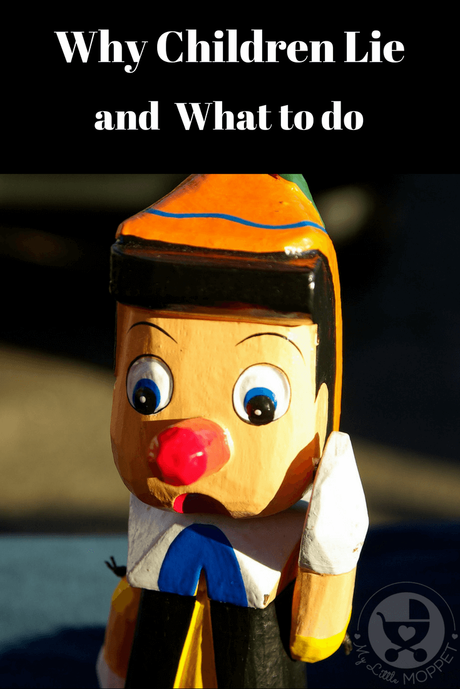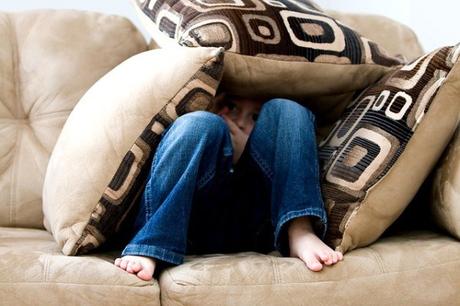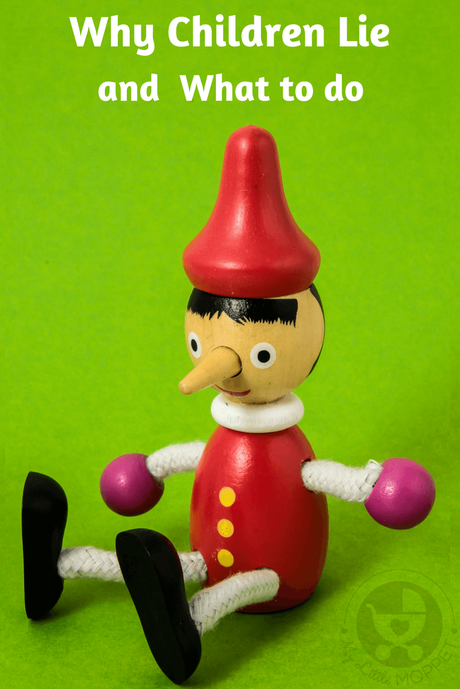January 31, 2018 Leave a Comment
Share Tweet Pin +1Shares 0It can be worrisome to catch your child in a lie. But to rectify this, we need to understand why children lie, so that we can tackle the situation in the right manner.
“Riya, wake up! It’s time to go to school.”
“Mumma, my tummy hurts. I don’t want to go.”
Sunita makes her 5-year-old daughter skip school that day. Half an hour later, Riya leaps out of bed, spending the rest of the day playing and watching. This was the second time in the month this had happened. After some gentle probing, Sunita learns that Riya had a trivial brawl with her classmates on both occasions and was afraid that teacher would scold her. She had lied to her mother about the stomach ache.
It is not uncommon for kids to tell lies, but such situations can make parents worried. If you have caught your child in the same situation and are wondering what to do, here is all the help you need.

Is it Normal for Children to Lie?
Lying is a kind of misbehavior, which is obviously not a good sign. However, there is a subtle difference between bad lies and white lies.
A bad lie is harmful to children’s development. It is malicious and deceiving in nature. If bad lies get them what they want, they can make it a habit. For example, “My friend’s parents buy him a new toy every time they visit a mall. They are so nice. My friend is so lucky!” In this case, the child is trying to manipulate his parents using emotional blackmail.
A white lie situation occurs when children want to be nice, safe or secretive in good spirit. It is harmless in nature. At times, it may be appropriate for the child to tell a white lie. For example, “Thank you uncle, I don’t eat chocolates” (safety), “Your dress is beautiful” (nice) or “I haven’t bought any present for your birthday” (secret).

Why Children Lie
There are umpteen reasons why children lie; here are the most common ones.
- Avoid or get out of trouble.
- Evade rebuke, embarrassment or physical punishment.
- Cover own or someone else’s wrongdoings.
- Have fun at the expense of others.
- Grab attention.
- Stay away from confrontations.
- Upset, mock or cheat others.
- Find out how people react to their lies and if they can take the advantage again.
- Save people around them from disappointment or hurt.
- Make themselves important, impressive or interesting in the eyes of others.
- Seek favour, especially for something they are being denied to have or do.
- Get away from an awkward situation.
- Keep secrets, especially if someone has specifically asked them to.
- Protect privacy or safety.

When and How Children Learn to Lie
Usually, children start lying from the age of three when they begin to realize that lies can’t be caught easily. According to a developmental model of lying, the first level of primary lies emerges around the age of 2–3 years when children are able to make factually untrue statements deliberately. However, they do not necessarily take into consideration the mental states of the listener. Secondary lies emerge around the age of four and require children to understand that the listener, unlike themselves, does not know the true state of affairs and thus is susceptible to false beliefs. Finally, around 7–8 years of age, children begin to tell tertiary lies where they can conceal their lies by maintaining consistency between their initial lie and follow-up statements.
It is a natural human tendency to lie. However, children may also start faking the truth when they watch their parents, peers or other adults telling lies.

What to do when Children Lie
It can be distressing to catch your child in a lie, but don’t worry, there are many things you can do.
- Create an atmosphere of honesty and trust around your children.
- Lead by example. If you lie in front of your child, they may take it as acceptable behavior.
- When you discover their lies, do not jump to conclusions, scold or punish them. It may make them feel hurt or resentful. Instead, listen to their reasons and dig into the truth.
- Let them make mistakes. Sometimes, lessons are learnt the hard way. Give them the confidence to admit their mistakes so that they don’t have to lie.
- Praise them for being honest when they own up to their wrongdoings.
- Explain to them about situations when white lies are okay to tell. For instance, they might have to lie to a stranger for safety’s sake. At the same time, emphasize that they should not hide such white lies from you.
- Tell them stories that have moral lessons on lies and truth.
The most important thing to remember in this case is to respond to the situation calmly, rather than reacting in a freaked-out manner. It’s also crucial to get to the crux of why children lie and to understand their point of view. Keep the message of honesty an ongoing lesson, by exposing them to movies, TV shows and books that emphasize this value. With patience and gentle correction, you can be confident of raising kind, honest and sincere human beings.

Author

Want to see videos of our recipes ?
VISIT OUR YOUTUBE CHANNEL Share Tweet Pin +1Shares 0
Filed Under: Parenting, Relationship Tagged With: children, kids, parenting, parenting tips
